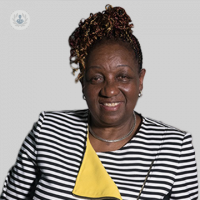What is interstitial cystitis? Ask an expert!
Written in association with:What does it mean if it hurts or burns when you pee? Do you need to go to the toilet more often than usual? Leading female urologist Miss Jean McDonald is here to explain interstitial cystitis (IC) and how it differs from a urinary tract infection.

What is interstitial cystitis (IC)?
Interstitial cystitis is a condition where there is pain in the lower abdomen and problems passing urine. It can occur in any age group but is more common in younger people. It is also called bladder pain syndrome, and it can affect one's quality of life and their well-being.
How does IC differ from a urinary tract infection (UTI)?
When one has a urinary tract infection, there's usually a bacterial organism involved. When urine is sent to the lab and it's cultured, a bacterial infection will be found, which is treated with an antibiotic. With interstitial cystitis, patients go to their general practitioner with the symptoms of a urinary tract infection, but when the GP sends urine to the lab, the result comes back as negative for an infection. When this occurs a few times, the patient is sent to a urologist, and then a diagnosis of interstitial cystitis can be made.
What are the symptoms?
The symptoms of interstitial cystitis vary. These symptoms may be present all the time or may go in phases.
- Usually, there's a strong urge to pass urine.
- Burning when one passes urine and intense pain at times
- Nocturia (getting up at night to pass urine)
- Frequently passing urine during the day
These symptoms are worse usually with periods. However, they go in phases, and at times, one will find that the symptoms are not as bad as other times.
Are some people more prone to IC than others?
The pathology of interstitial cystitis is complex, and therefore, there have been some associations with other diseases like lupus, fibromyalgia, and irritable bowel syndrome. However, it's very difficult to say that just one type of person is more prone to interstitial cystitis. It's a very complex disease and there has been lots of research trying to find out the answers to these questions.
How is IC treated?
Unfortunately, there is no cure for interstitial cystitis, but there are a lot of treatments that can be tried. No one treatment works for everyone, but there are combinations of treatments that can be used.
Lifestyle changes can help. These include making sure one has an adequate fluid intake, stopping smoking, making sure that when one goes to the toilet they empty completely, and trying to reduce stress, as stress plays a very important part in exacerbating episodes of interstitial cystitis.
There are various medications that one can use. Patients are usually complaining of pain and various analgesics can be used to try and relieve this. In addition, if one has increased frequency, passing urine quite a lot, there are various medications that can be given to slow down the bladder so that the patient is not passing urine as much. There are other treatments that can be given, like administering bladder medications to ease soreness. These preparations are hyaluronic acid or chondroitin sulphate, which is instilled into the bladder over a period of time, and these preparations relieve the pain which is usually the hallmark of interstitial cystitis.
There are other supportive measures that may help, for example, bladder retraining, pelvic floor exercises, and also posterior tibial nerve stimulation to try and reduce the urgency that these patients have. Some of these treatments can reduce the amount of times that one is going to the toilet to pass urine.
Patients can also have surgery. This initially involves looking inside the bladder and hydrodistension, which is filling the bladder with water or saline. This breaks down ulcers in the bladder so that a new layer without ulcers can form, and therefore one finds that the bladder is much less painful. I spoke about neuromodulation with posterior tibial nerve stimulation, but in some cases the bladder becomes quite shrunken and patients may need to have the bladder removed. That is a cystectomy. This of course only happens in extreme cases.


